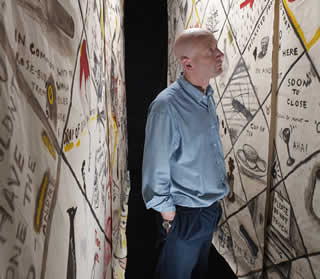
Silence and Painting
Although words feature extensively in Jeff Gibbons paintings ironically I am often at
a loss for what to say. Prolonged silence. Visual as well as tactile, layered sources
combine to create the work. These are eclectic, from pop culture, especially music and
chat shows, to painting's past, architecture, philosophy, theology, death, deprivation,
sex and religion. The novelist Aaron Appelfeld particularised the nuances of human
generosity in the throes of despair with the distinction that 'man is not an insect'.
Feeling abject is part of life and painting provides a means to bring abjection into a
frame of reference. The works titles are important, 'there is no point in this painting'
immediately you have it, the failure of painting in general and in particular, to extend
the sum of its parts. But because they address pointlessness the idea of futility is
inescapably present. Deadpan, the humour of the perspectival exercise, is neatly not the case.
Another instance is in the signing of work, when faux naïf signatures mock the
studiously acquired letter formation as well as the amateur's need to claim the work's
identity. The play on signature and language is poignant and he teases authorial
certitude whilst asserting it. Un-stretched canvas emphasises it's flimsy quality, like
the paint it's bare-faced. The handling is brash but surprisingly subtle, and it subverts
expectation, again coming up against the serious side of humour. A cup of tea, but
you'd prefer wine. The letter T removed from the word paint – pain drops in, beside
the economically depicted polystyrene cup is a pill, liquid everywhere, in the fluidity
of paint and liquidity of existence. The application of paint is like spew and it is
strangely beautiful. It resonates despite the bleak character of much of the work.
'Alley', the large walk-in painting constructed from facing canvases forces the
viewer's proximity to painting's physicality and substance, literally as well as
metaphorically. One is led down the alley to a no man's land on the edge of culture
where bad things happen, bones, brains and brief encounters, the phrases recall stand
up comedy, 'a mere pin let life begin' or 'doctors find no cure for death but are
working on it'. Marks and images converse with painting's language, especially the
vanitas tradition, to make paintings about death and life's smug vanity, the still life,
nature morte, is brutal fact; the thin line between life and death is what these work
insist upon.
Gibbons work demands reflection on the distinctive condition of looking and thinking
about the action of looking at painting 'how to look at a painting'. There is no easy,
fast response. Perceptually they are slow release. These paintings are not about the
reassurance of making comfortable relations with the world. The condition of silence
brings the possibility of accepting this kind of uneasiness.
Jo Melvin |